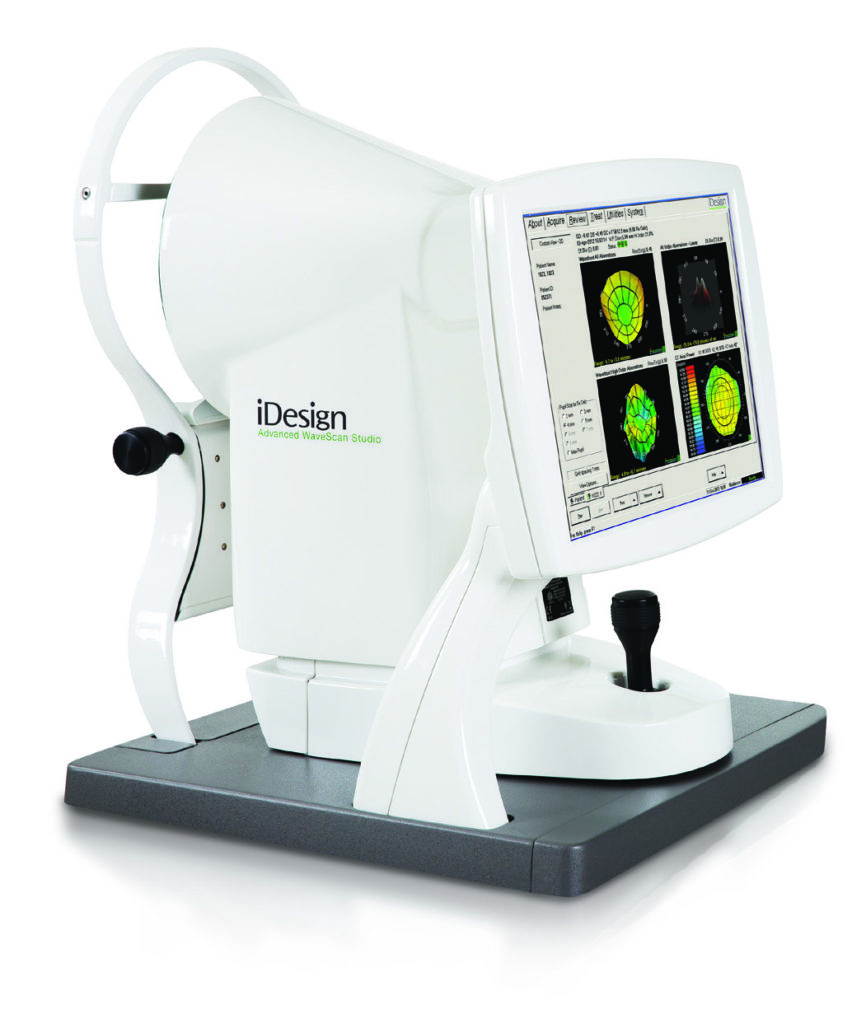
iDESIGNTM Refractive Studio
Measurement Principle: Hartmann-Shack
Wavefront Diameter: Up to 8.5 mm
Analysis: Wavefront Fourier analysis equivalent to the 16th order term
Spherical Equivalent Range: -16 D to +12 D (for a 6-mm wavefront diameter), 0.01 D increments
Cylinder Range: Up to 8 D (for a 6-mm wavefront diameter), 0.01 D increments
Axis: 1° increments
Measurement Spatial Resolution: 0.177 mm
Data Points: Approximately 1250 measurement points for a 7-mm pupil
Map Types: All order aberrations wavefront, high order aberrations wavefront, all order aberrations refractive correction, high order aberrations refractive correction, all order aberrations point spread function, high order aberrations point spread function, all order and high order aberration dfferences, wavefront irregularity, wavefront summary metrics
Measurement Principle: Full corneal gradient
Measurement Area: > 8.3 mm surface area with true central 3-mm data
Data Points: > 1000
Map Type: Axial power and elevation (best fit sphere), axial power and elevation differences, mean curvature, tangential curvature, topography irregularity, internal aberration (low and high order), elliptical best fit, refractive power, corneal aberrations (low and high order), summary metrics
Measurement Range
• Sphere: -16 D to +12 D (for a 6-mm wavefront diameter), 0.01 D increments
• Cylinder: Up to 8 D (for a 6-mm wavefront diameter), 0.01 D increments
• Axis: 1° increments
Measures spherical surface (K1, K2, axis)
Provides automatic acquisition of low mesopic and photopic image.
Measurement Range: 2.0 to 9.5 mm with 0.1 mm resolution.
1. iDESIGN Op Manual 0110-3605, current revision.

iDESIGNTM Refractive Studio
Measurement Principle: Hartmann-Shack
Wavefront Diameter: Up to 8.5 mm
Analysis: Wavefront Fourier analysis equivalent to the 16th order term
Spherical Equivalent Range: -16 D to +12 D (for a 6-mm wavefront diameter), 0.01 D increments
Cylinder Range: Up to 8 D (for a 6-mm wavefront diameter), 0.01 D increments
Axis: 1° increments
Measurement Spatial Resolution: 0.177 mm
Data Points: Approximately 1250 measurement points for a 7-mm pupil
Map Types: All order aberrations wavefront, high order aberrations wavefront, all order aberrations refractive correction, high order aberrations refractive correction, all order aberrations point spread function, high order aberrations point spread function, all order and high order aberration dfferences, wavefront irregularity, wavefront summary metrics
Measurement Principle: Full corneal gradient
Measurement Area: > 8.3 mm surface area with true central 3-mm data
Data Points: > 1000
Map Type: Axial power and elevation (best fit sphere), axial power and elevation differences, mean curvature, tangential curvature, topography irregularity, internal aberration (low and high order), elliptical best fit, refractive power, corneal aberrations (low and high order), summary metrics
Measurement Range
• Sphere: -16 D to +12 D (for a 6-mm wavefront diameter), 0.01 D increments
• Cylinder: Up to 8 D (for a 6-mm wavefront diameter), 0.01 D increments
• Axis: 1° increments
Measures spherical surface (K1, K2, axis)
Provides automatic acquisition of low mesopic and photopic image.
Measurement Range: 2.0 to 9.5 mm with 0.1 mm resolution.
1. iDESIGN 2.1 Op Manual 0110-0891, Rev. A, Feb. 2019. REF2020RF4010.
For healthcare professionals only. Please reference the Instructions for Use for a complete list of Indications and Important Safety Information and contact our specialists in case of any question.
© AMO Manufacturing USA, LLC. 2022. PP2022RF4023 v2